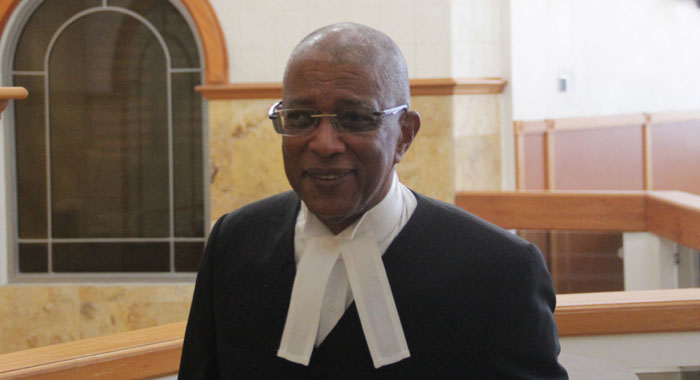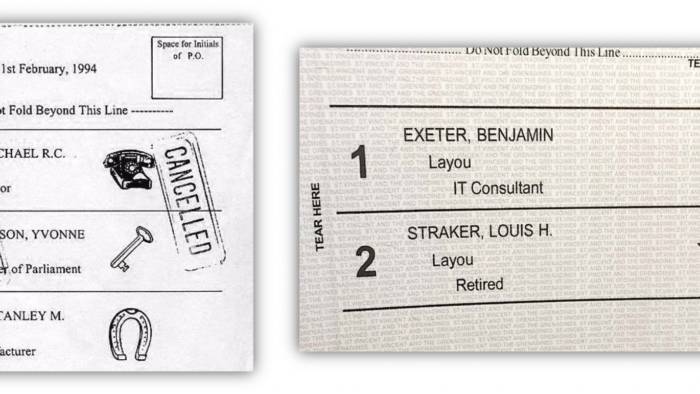The ruling of the High Court in the election petitions case suggests that it is perfectly legal to count as a valid vote, a ballot that has no official mark or initial of the presiding officer.
This, after then acting High Court judge, Justice Stanley John, ruled on March 21, that since the counterfoil is part of the ballot paper, placing the official marks on the counterfoil, rather than the ballot — the part of the ballot paper on which the voter expressed his preference — does not invalidate the ballot.
However, after a vote is cast, the counterfoil is separated from the ballot and placed in separate containers.
And, in the absence of the officiating mark on the part of the ballot paper on which the voter expresses their preference (“the ballot”), there is no way to know, definitively, that the ballot had been issued by the presiding officer.
The issue was one on which the court was asked to pronounce as part of the petition filed by Benjamin “Ben” Exeter of the main opposition New Democratic Party (NDP), challenging the results of the vote in Central Leeward in the Dec. 9, 2015 general election.

Exeter’s evidence was that, at polling division CLF, none of the 222 ballots cast had the initials of the presiding officer or the official mark and they were cut in such a manner that a portion of the ballot was torn off.
He further said that in polling division CLF-1, 99 ballots were mutilated in a manner similar to CLF.
The respondents have not disputed the allegations made in relation to polling divisions CLF and CLF-1.
Susan Thomas and Wallace Christopher, who were presiding officers at two polling stations in Central Leeward, told the court that they had placed in their ballot boxes ballots without any officiating marks or initials.
They said that they counted these ballots as valid although their training was that a ballot without the presiding officer’s official mark is invalid.
Maia Eustace, a lawyer, who was a roving agent for Exeter on election day, said that she observed that the design of the ballot used in the election was flawed.
The flaw, Eustace said, was in that the space reserved for the official stamp and initials of the presiding officer was located on the counterfoil rather than on the ballot paper.
As a result, she concluded that the ballots were irregular, she told the court.
Exeter’s lead lawyer, Queen’s Counsel Stanley John submitted to the court that with regard to the 222 ballots in CLF and 99 in CLF-1, the court ought to declare them invalid and they ought not to have been counted.
However, Senior Counsel Anthony Astaphan, a lawyer for the respondents, in his written submissions, argued that the allegations made in respect of those two polling divisions have raised mathematical issues of fact.
Astaphan submitted that Exeter won 247 of the vote cast in CLF and CLF-1 and Sir Louis Straker of the Unity Labour Party, who was declared winner of the seat, won 263.
The lawyer further reasoned that if, therefore, the 246 and 267 were deducted from the total votes cast for the Exeter and Straker, the results of the election will not have been affected.
Justice John accepted Astaphan’s submission but said it does not detract from the allegation made that the absence of the official mark and the initials of the presiding officer amount to a serious breach of the rules.
Senior Counsel Douglas Mendes, the lead counsel for the respondents, accepted that the ballots in CLF and CLF-1 did not bear the official mark but were nevertheless accepted as valid by the presiding officer.
In his written submission, Mendes asked whether if a vote that appears on a ballot paper that contains the stamp of the presiding officer on the counterfoil and not the ballot invalid or void?
He referred to Rule 15 which defines ballot papers and argued that Rule 15 provides a direct and simple definition of “ballot paper”.
Mendes further submitted that the ballot paper is the whole of the document in “Form 7”.
Justice John said that having seen the “Form 7”, he was satisfied and holds that the entire document, that is to say, “ballot and counterfoil” comprises the “ballot paper”.
The judge said that the court was further satisfied that whereas “Form 7” provides a space for the “initials of the presiding officer” there is no space provided for the insertion of the official mark and accordingly the official mark on the counterfoil does not invalidate the vote.
Justice John ruled: “I am fortified in my view as, under Rule 16, it is mandatory that every ballot paper be marked with an official mark, which shall either be stamped or perforated but there is no stipulation as to the precise location on the ballot paper where the official mark is to be stamped or perforated. Rule 31(1) which makes it mandatory for the presiding officer to mark the ballot paper with the official mark, is silent on the location for the mark.”
The judge said it must be borne in mind that the case is not concerned with the absence of the presiding officer’s initials.
“The evidence is that all ballot papers under challenge were initialled. This case is concerned with the effect of putting the initials in the wrong place…
“The Court is satisfied upon a clear interpretation of the Rules and the authority cited, that the presiding officer’s initials on the part of the ballot referred to as the counterfoil does not invalidate the votes and they were properly counted,” Justice John ruled.
The judge dismissed the petition, along with one challenging the result of the vote in North Windward, another of the eight seats the party won on its way to a fourth consecutive term in office.
The NDP has signalled its intention to appeal the ruling in both petitions.







I must be missing something. If they are valid, is the judge then saying that anyone can stuff a ballot box? And given that some persons took their own home overnight, how else do we know that those were all legitimate votes. My god!
Actually, I reached the same impartial decision long before the case began after reading the relevant part of our 1982 Representation of the People Act. To repeat what was said above: (1) a ballot paper has three seperate parts — the ballot that is placed in the box; the counterfoil; and the stub and (2) the Act does not specifiy where on the ballot paper the initials of the presiding officer or the offical mark have to be located.
I also agree that whether spoiled or mutilated ballots or those with or without marks and/or initials are added or subtracted from the two candidates, this did not affect the outcome of the election, namely that Louis Straker received more votes in Central Leeward than Ben Exeter.
That the Petitoners wanted such ballots tabulated for or against only one of these candidate, namely the one of their choice, speaks for itself.
How about if none of the sections of the ballot paper were marked by the presiding officer. Is there not more chance such ballots were stuffed in the box either prior to or after the poll took place.
If all the spoiled, or most of the spoiled ballot papers were allotted to one candidate, surely to include those would give one candidate an advantage. Remember ballot papers are spoilt for many different reasons, sometime even because the voter wanted to spoil them having changed his mind over whom to vote for. Sometimes voting for more than one candidate, a biased counter who would he allot that vote to?
Also what if the ballot box is stuffed with a hundred extra ballots in the favor of only one of the candidates, are you saying that doesn’t change the results.
Mr Confused is correct when the chain of custody is broken and those boxes go overnight into someone’s home without any oversight from any other official that is indeed a real worry to any intelligent person.
If the official stamp is not necessary and if there can be no spoilt ballots in the process and if all those irregular things that was said to have been done, including those things that was declared as just plain errors and/or mistakes were to be treated as valid in any given election here, then this could give rise to serious bouts of “ballot-stuffing” which could then be treated as quite acceptable. Very bizarre. Very bizarre indeed!
Since the secret Ballot of one man one vote, is very much part of the democratic process, then what we would be witnessing would have given rise to would be a very “undemocratic” process. A process departing from that system invented by the ancient Greeks, adapted and promoted by the British as a system of fair representation and thence handed down to us in good faith.
The new system there envisage would be utterly a scammer’s and cheater’s paradise! A paradise to be welcomed by all despots, undemocratic knaves, scoundrels, fraudsters, rogues and cunning reprobates.